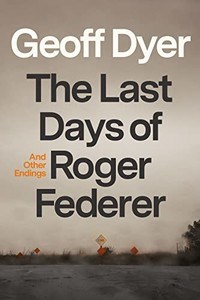Asad Raza interviews Geoff Dyer at Bookforum:
 ASAD RAZA: Your new book, The Last Days of Roger Federer (Farrar, Straus and Giroux, $28), is in part a meditation on the tennis great and his retirement. It’s also about the late careers of other athletes, writers, artists, and musicians—Bob Dylan, Eve Babitz, Beethoven, to name a few. In this sense, you are writing about time, and this is reflected in the book’s unique formal structure. Can you tell me how that came about?
ASAD RAZA: Your new book, The Last Days of Roger Federer (Farrar, Straus and Giroux, $28), is in part a meditation on the tennis great and his retirement. It’s also about the late careers of other athletes, writers, artists, and musicians—Bob Dylan, Eve Babitz, Beethoven, to name a few. In this sense, you are writing about time, and this is reflected in the book’s unique formal structure. Can you tell me how that came about?
GEOFF DYER: With great pleasure! The book isn’t one of these essay hampers, which I’ve published, where you sort of dump into a big bucket the stuff you’ve written for the last ten years or whatever. It’s actually got a very intricate structure. With Nietzsche occupying a dominant place in the book, I felt it would be nice if it could reflect his idea of the eternal recurrence in some way, so I started thinking of loops, which were in my mind anyway because there’s also a section about William Basinski’s Disintegration Loops. I liked the idea of the number sixty, which tends to suggest either sixty seconds or sixty minutes, going round like that. So the book has three parts, or loops, made up of sixty sections. In the discussion of the eternal recurrence, I mention Christian Marclay’s twenty-four-hour film, The Clock. There’s no climactic moment on the hour, you just keep looping round for 86,400 seconds. The book, at a certain point, was about 90,000 words, so I thought that, with all sorts of adding and subtracting, I’d make the number of words the same as the number of seconds in the day—though I only reveal this right at the end, in the postscript.
more here.
